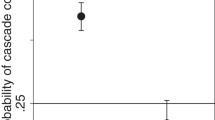Abstract
We consider a model of strategic reputation for online sales using an exchange format. In the model sellers can sell a cheap good to build up reputation, and then cheat when selling a more expensive good. We identify conditions under which a seller will always be honest.
Similar content being viewed by others
References
E. Friedman and P. Resnick, The social cost of cheap psuedonyms, J. Econom. Managm. Strategy 10 (2001) 173–199.
D. Houser and J. Wooders, Reputation in auctions: Theory and evidence from eBay, Working paper, University of Arizona (2001).
IFCC Internet Fraud Report, prepared by the National White Collar Crime Center and the Federal Bureau of Investigation (2001).
IFCC Internet Fraud Report, prepared by the National White Collar Crime Center and the Federal Bureau of Investigation (2002).
D. Lucking-Reily, Auctions on the Internet: What’s being auctioned, and how?, J. Industrial Economics 48 (2000) 227–252.
D. Lucking-Reily, D. Bryan, N. Prasad and D. Reeves, Pennies from eBay: The determinants of price in online auctions, Working paper, Vanderbilt University (2000).
D. Lucking-Reily and D.F. Spulber, Business-to-business electronic commerce, J. Econom. Perspectives 15 (2001) 55–68.
M.I. Melnik and J. Alm, Does a seller’s reputation matter? Evidence from eBay auctions, J. Industrial Economics 50 (2002) 337–349.
R. Resnick and R. Zeckhauser, Trust among strangers in Internet auctions: Empirical analysis of eBay’s reputation system, Draft prepared for NBER workshop (2001).
P. Resnick, R. Zeckhauser, J. Swanson and K. Lockwood, The value of reputation on eBay: A controlled experiment, Working paper (2002).
R. Wang, Auctions versus posted-price selling, Amer. Econom. Rev. 83 (1993) 838–851.
Author information
Authors and Affiliations
Corresponding author
Rights and permissions
About this article
Cite this article
Lyudyno, G., Sarangi, S. e-Honesty: when does it pay?. Netnomics 6, 209–219 (2004). https://doi.org/10.1007/s11066-005-2305-x
Accepted:
Published:
Issue Date:
DOI: https://doi.org/10.1007/s11066-005-2305-x




